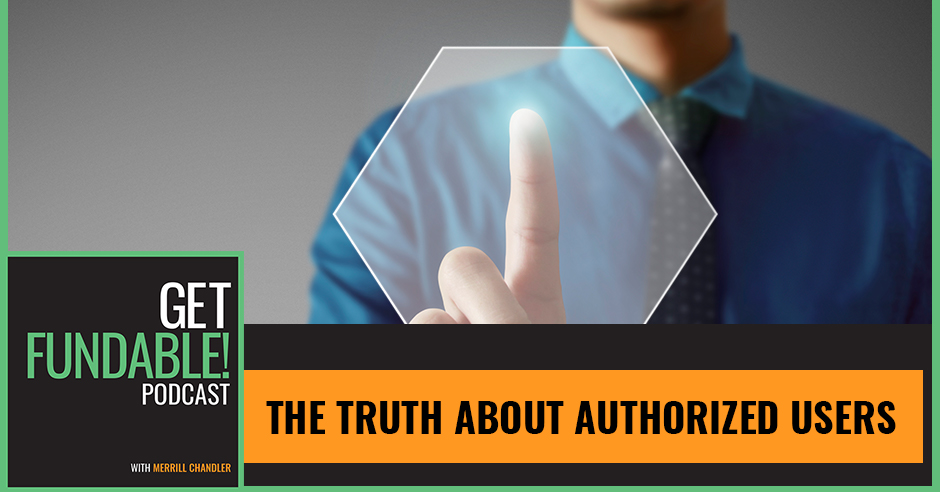
What exactly are authorized users and how does the process work? In this episode, Merrill Chandler takes an in-depth look into the truth about them. There is so much misinformation about authorized users…especially in a personal or global financial crisis. What you do and how you interact with other people’s accounts can be a deal-breaker. Listen to Merrill as he shares some details about whether you should allow any authorized user on your accounts or not, and take note of how they can affect your financial profile.
—
Watch the episode here:
Listen to the podcast here:
The Truth About Authorized Users
I’m so excited to discuss this awesome subject matter—the do’s and don’ts of authorized users! When dealing with this topic, it’s important to be aware of the loads of misinformation out there, especially if you are in a financial crisis (either global or personal). What you do, how you allow other people to interact, and how you interact with other people’s accounts can be drastic deal-breakers. We’re going to take a deep dive into how authorized users work and their impact on your fundability™. You can become involved in this concept in one of two ways—either being associated as a user or giving permission to somebody else to use your accounts. But the important point that I want to make is that it’s better to not do it at all rather than doing it in the wrong way…because then you are subject to losing the account or not providing what you think you are giving to the person you’re trying to help.
So, first of all…what is an authorized user? An authorized User (also known as an AU) is someone else who you give permission to access and use your credit account. However, don’t get this confused with a joint account…since in this case, you aren’t an actual signer on the account. Instead, you’re only authorized to use the account. Sometimes, you may even be given a card that has it’s own sixteen-digit number, different from the owner of the account. And then, you get to use any amount you wish—unless the owner puts a limit on it. You can be authorized on both personal and business accounts. But personally…I would never, under any circumstance, allow someone to be an authorized user on my personal account. On the other hand, business accounts are different. My business partners and I are all authorized users on our corporate accounts and business accounts. The reason why I feel so strongly about this is because the rules are very different for personal and business side of things—and we’re going to address every single one of these little variations.
The first time I was introduced to authorized users was in college. One of my friends was excited because he got his mom’s credit card in the mail. I was a little confused, so I asked him if he can use the account. He said yes, but only for emergencies. Years later, I still had some questions about how this concept works. Brad (my business partner) and I went to FICO 16 a few years back, where we had several different meetings with the FICO score developers. This is when we decided to ask them a few of these questions—one of them being how they score authorized users. They responded with, “We’ve gone back and forth on whether or not to give points to an authorized user.”
In the system (which at the time was FICO 9) the software does not give any value to an authorized user. However, FICO 8 did give value to the authorized user, which was calculated at 40% of the points. So if the owner of the account were to get 100 points…the authorized user would only get 40. And to add on to this…while the authorized user would only get a fraction of the points, they would absorb 100% of the negative impact on their account in the owner made a late payment. If the account goes delinquent, gets charged-off, or goes to collections, both the owner and the authorized user will be punished equally. When Brad and I asked why that might be…the explained that the math algorithm in the software isn’t able to detect who is specifically making each charge. But, since they do know who is on the account, they give each of them equal negative impacts, since they’re technically both responsible.
Here is where it gets crazier…even if the authorized user is the one making the on-time payments, the owner will still get the all of the credit. Depending on the software version, there is little-to-no benefit to being an authorized user. It is high risk, low rewards. That’s why we have to start out by establishing the actual worth of being an authorized user. One of the only counter-arguments would be the example of my friend in college. If you want to give your child a credit card for emergency purposes, I understand why you are making that decision. However, the same problems still exists where your credit would suffer just because of your child’s decisions.
Authorize users get, depending on the software, very little or zero positive benefit. Click To TweetWe are in very perilous times for authorized account users. Being an authorized user to build your credit usually doesn’t work. No matter the situation you’re in, it’s still risky because we don’t entirely understand what’s going on nowadays. It’s even a risk for people who purchased a trade-line and are an authorized user on someone else’s account. The whole business of buying a trade-line is dangerous because you are a complete stranger to the owner of the account. If you don’t know what that person is like…how can you even begin to trust them?
Now that I’ve explained how these situations can be so dangerous…I should warn you. If you happen to be the owner of an account that has an authorized user attached to it (whether it be your child, your partner, etc.) and you know for a fact that you are going to make a late payment…please take the authorized user off your account before the payment becomes late. If you don’t, the authorized user will suffer all because of a mistake that isn’t their fault. This is a serious survival strategy that you have to implement! Pay attention to the status of your account, because you need to be prepared to quickly remove any authorized users even before your account goes southbound. And if you’re in the process of creating this financial relationship on the personal side of things, I highly recommend that you don’t.
With the software versions of FICO 8 and FICO 9, you may get a boost in your score…but if you’ve read my book or attended my bootcamp, you know that your score determines the rate and term, not if you get approved! There isn’t a single lender out there who will approve you for a high value card, auto loan, mortgage, etc. solely based on your credit score…it’s not as important as it may seem! Instead, it’s all based on your profile. So if you see your score go up, don’t get too excited…because that is not the determining factor of whether or not you are fundable. With all of this considered, don’t involve yourself with authorized users thinking that it will boost your credit.
I now want to tell you a story…one that Brad always tells about one of the clients he was coaching at the time. This client was trying every tactic possible to qualify for a Chase credit card, since it was part of his optimization plan. Even though we had a lot of work to do to get him into a good position…he finally ended up getting approved. I believe the limit amount was a $15,000, so he was very excited. He worked hard to obtain it, making that card super valuable to him. But this is where things took a turn. He reached out to his friend, basically saying, “I finally got one, and I want to hook you up too!” So…he made his friend an authorized user on that card. This gentleman was thrilled to generously give his friend a leg-up, and it was all good natured at first. But he had forgotten all of the training that he had previously received from us. The problem is the fact that he hadn’t discussed this important decision with his team before going through with it. If he had, they would have warned him of how this will more than likely impact him in a negative way.
So—to nobody’s surprise but his own—his friend had bad credit since it had been focused significantly on revolving accounts. It hadn’t even been thirty days to the next reporting cycle when this client got both his account and card shut down…the same one he had worked so hard for! This is when he called us to ask why it happened. We simply told him that it’s because he had gave authorized user status to a person with a derogatory revolving account profile and several bad borrower behaviors!
There are other things that we can use to illustrate bad borrower behaviors…but I want to stay focused on this. This individual lost his amazing relationship with Chase because he put a wrong person on as an authorized user. Like I always teach, the automatic underwriting software is constantly following your behaviors—so it was no different for this man’s friend. Please use this as a cautionary tale! We do not want to put people on as authorized users who are going to carelessly destroy our relationship with the lender…especially when it’s one that we put so much effort into!

Even if the authorized user is making the payments, the owner of the account gets credit for the on-time payments.
For a quick little recap: authorized users—depending on the software—get very little positive benefits. And if you do receive a benefit, it’s more than likely going to be just a subtle rise in your score. And this wouldn’t even be that influential, since scores don’t get approvals for any type of meaningful credit. For example, you could get a Victoria’s Secret card, Forever 21 card, Home Depot card, etc. but none of those are going to get you anywhere in your relationships with the banks. That subtle raise in the score is not going to help you establish any meaningful credit as an authorized user. And if you have an authorized user…always have a game plan in mind to remove somebody from your profile if needed. In this specific case, a lot of people run into the issue where (as another example) they have had the same authorized user for the past ten years…to a 360-month account. This will put you in a pickle because there is a ton of value that has been added to your profile. So if you remove them, you’re losing the those 360 months.
This further proves that—regarding authorized users—there are landmines everywhere! It’s also the reason why I’m informing all of you not to get yourself involved with this process. If it’s something that you’ve already done, I’d advise you to stop and then rid your account of it all together. It may seem selfish, but (using the example from before) you need to protect your own profile before you start to help somebody else’s. And when I say this, I don’t mean in any way that this is a cutthroat, dog-eat-dog situation. I’m just warning you to be careful when it comes to these situations.
As mentioned before, the severity of the risk can depend on how long you’ve had the authorized user on your account. If it was a rather recent add-on (under 24 months old), it can be mitigated by removing it. But if you’ve had the same authorized user for years and years…we need to talk. Even if you put somebody on temporarily and then take them off, that authorized user will still remain on your profile for ten years after the date of closure. Luckily, there are other strategies out there to build your profiles rather than buying a trade-line or becoming an authorized user. Back in the 1990’s, there was something called ‘piggybacking strategies.’ But FICO does this job to prevent fraud and to make sure that they are protecting lenders in the best way possible.
Subsequent iterations of the scoring software have diminished any value that authorized users used to have. Now, there is no marginal benefit…and instead a huge potential downside to it. Even if you are considering doing this for your children in case on an emergency, you still have to determine whether or not it would be worth it since you wouldn’t even be helping them build up their profile in the process! Trade lines—no matter if they’re closed or open—are a rookie borrower behavior…including if you share it as an owner.
I’m thrilled that you were able to read through this essential information! The truth about authorized users happens to be a heavily debated topic since many people don’t know what FICO is actually measuring. My team and I are here to help you build, preserve, and maintain a flawless and fundable borrower profile…but being the recipient or deliverer of an authorized user won’t help you in any way towards that goal!
Love the show? Subscribe, rate, review, and share!




